As the fourth most popular dog breed in the United States, German Shepherds have a pretty good reputation. They’re smart, easy to train, and incredibly loyal. But, what complaints do people have about their German Shepherds?
The most common complaints about German Shepherds are that they need too much exercise, bark a lot, and aren’t always stranger-friendly due to their guarding instincts. They’re also expensive to feed and vet, especially if they develop joint issues, which they’re highly prone to.
Let’s dive into these issues and the rest of the 19 common complaints about German Shepherds to see if this breed is right for you.
Why do People Love German Shepherds?
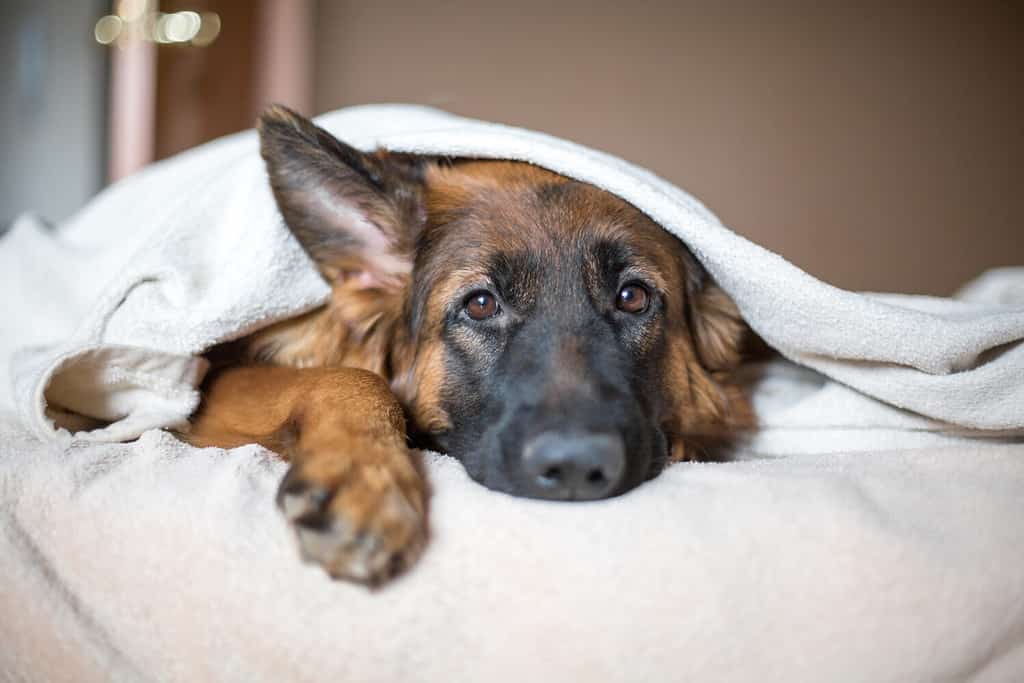
German Shepherds are very popular pets.
©Korneeva Kristina/Shutterstock.com
Before getting into common complaints about German Shepherds, it’s only fair to talk about why so many people love them!
These dogs are intelligent people pleasers who are great fits for a variety of service work. They’re incredibly loyal, typically choosing a person and becoming quite clingy to them. They’re affectionate, playful dogs who will go to the ends of the earth to protect their loved ones.
However, their working drive and protectiveness can be the reasons this breed is a poor fit for you. German Shepherds are also prone to a variety of health problems, especially musculoskeletal disorders.
Common Complaints About German Shepherds
#1: German Shepherds are Incredibly Active

These driven dogs need plenty of daily exercise.
©Rita_Kochmarjova/Shutterstock.com
Adult German Shepherds need a lot of physical activity to stay healthy and out of trouble. Underexercised dogs may become anxious or bored, leading to destructive behaviors.
Daily walks aren’t quite enough for most shepherds, since they have a strong working drive. They prefer having a job, whether real or made-up. (Think herding sheep vs. fetching the mail.)
They also need room to run and play.
If you’re a very active person with a lot of time on your hands, German Shepherds are perfect–but if not, they’re not the right breed for you!
#2: They Get Bored Easily

They get bored easily since they’re so smart.
©Vach cameraman/Shutterstock.com
As we touched on above, physical exercise alone won’t satisfy your German Shepherd. They’re highly intelligent and require more mental enrichment than many other breeds.
They’ll enjoy nose work games, puzzle toys, herding balls (or herding real livestock!), flirt poles, and more. It’s best to try a variety of activities to learn what your German Shepherd enjoys most. After all, these dogs were bred to perform such a large variety of tasks!
Training new cues is another great way to engage your shepherd’s mind, and the possibilities are endless!
#3: They’re Strong Dogs

German Shepherds are strong dogs that need proper training, which should never include aversive methods.
©iStock.com/Milan Krasula
German Shepherds are large and muscular. If they want to pull you on a leash, you may not be able to hold them back.
This is a common complaint amongst shepherd owners who can’t hold back a dog that weighs up to 90 pounds!
Of course, there are plenty of ways to train your pup not to pull on leash, and this training should start the moment you bring your dog home. But if you have an untrained adult dog, you’ll still face some challenges in the meantime.
It’s also important to train these guarding dogs well so that they don’t become fearful or aggressive, especially given their size.
#5: They Weigh a Lot

German Shepherds eat more than smaller dog breeds.
©Snezhana_G/Shutterstock.com
At 50-90 pounds, these are medium-large dogs that can cost more than smaller breeds and are more difficult to handle. Some people won’t be able to lift a full-grown German Shepherd in a crisis, such as if the dogs have joint issues that prevent them from walking.
Their weight can also be a little annoying, or even painful, if your dog decides they want to sit on your lap! However, most people complain about this aspect only jokingly–who doesn’t love puppy cuddles?
There are also pros to having a large breed, such as protection, less chance of stepping on your pup and hurting them, and even personal preference. Some people simply prefer larger dogs!
#6: German Shepherds are Expensive
They’re more expensive than smaller breeds as well.
©Beach Creatives/Shutterstock.com
As large dogs, German Shepherds are also more expensive. They cost more to feed, their everyday items cost more, and vet trips will likely be more costly as well.
It’s important to keep these costs in mind before adoption so that you aren’t sticker-shocked by the cost of parasite prevention medication or your dog’s crate.
#7: Their Intelligence Can Get Them into Trouble
Intelligence comes with its downsides, such as the ability to get into things they shouldn’t.
©Andrey_Kuzmin/Shutterstock.com
You might think that having a smart dog could only be a good thing–but if so, you’ve likely never had a dog as smart as a German Shepherd!
There are definite drawbacks to their intelligence, including that they can learn things without being directly taught. They may pick up on how to open the treat cabinet or even the front door. Some households will need to utilize child locks to keep their dogs safe and out of trouble!
#8: Some German Shepherds Don’t Like Strangers

They may be fearful or aggressive toward strangers, especially when not properly socialized.
©Debbie Hendriks/Shutterstock.com
Guard dogs tend to be wary around strangers since they wouldn’t be so protective if they trusted everyone immediately!
However, this can be a problem when taking your dog in public. Especially without early socialization, German Shepherds are outright fearful of new people and situations.
That said, once they know and love you, a German Shepherd is incredibly loyal, affectionate, and protective.
#9: German Shepherds Shed Heavily

These dogs shed heavily, especially during shedding season.
©DreamBig/Shutterstock.com
German Shepherds have medium-length coats that shed year-round, and especially heavily during shedding season twice a year. In the spring and fall, you’ll be able to pluck clumps of fur from their coat.
They require brushing every few days, and daily during shedding season. If unbrushed for too long, your German Shepherd’s coat can become matted. This is painful for the dog and can cause skin issues if left in place for too long.
#10: They Bark a Lot

They’re alert watchdogs that tend to bark frequently.
©Eudyptula/Shutterstock.com
These are very vocal dogs! German Shepherds have been bred to guard their homes and people, and they take this job extremely seriously.
You can train your dog not to bark at the mailman or random passersby, or to stop after just a few quick barks. Keep in mind that a dog trained not to bark might not warn you if something is truly amiss!
#11: They’re Clingy

They love to be around their people, which can be problematic if you’re gone often.
©SB Arts Media/Shutterstock.com
These dogs love to be at your side. They’re loyal and tend to choose a favorite person who they prefer to be around.
This can be bothersome if you’re the type of person who wants their own space, as your German Shepherd might be a cuddle bug who won’t leave you alone!
They can be taught to respect your boundaries to some extent, but much of this just comes down to a dog’s personality. Like people, some are more touchy-feely than others!
#12: They’re Prone to Separation Anxiety

They may become stressed if left alone for long periods.
©Vach cameraman/Shutterstock.com
German Shepherds are quite clingy and may develop separation anxiety if not taught how to tolerate being alone or if they’re left alone for long periods. It’s important to strike the right balance.
Start by leaving puppies alone in another room of the house, keeping them occupied with their food or toys. Gradually, you’ll be able to walk away for longer periods, then transition to leaving home completely.
A full workday is too long for your dog to be completely alone, though, especially on a consistent basis. Keep your goals for your shepherd realistic and achievable.
#13: They Do Best in Family Homes

They do best in family homes with multiple adults to provide care.
©Versta/Shutterstock.com
If you live alone and can’t have someone stop by midday, your German Shepherd is likely to struggle and may develop separation anxiety or destructive behaviors.
They thrive in family homes where someone is around the majority of the day or with people who work from home often.
They can also do well with a dog walker or family member stopping in midday to give them a potty break, attention, and exercise.
#14: They’re not Apartment Dogs
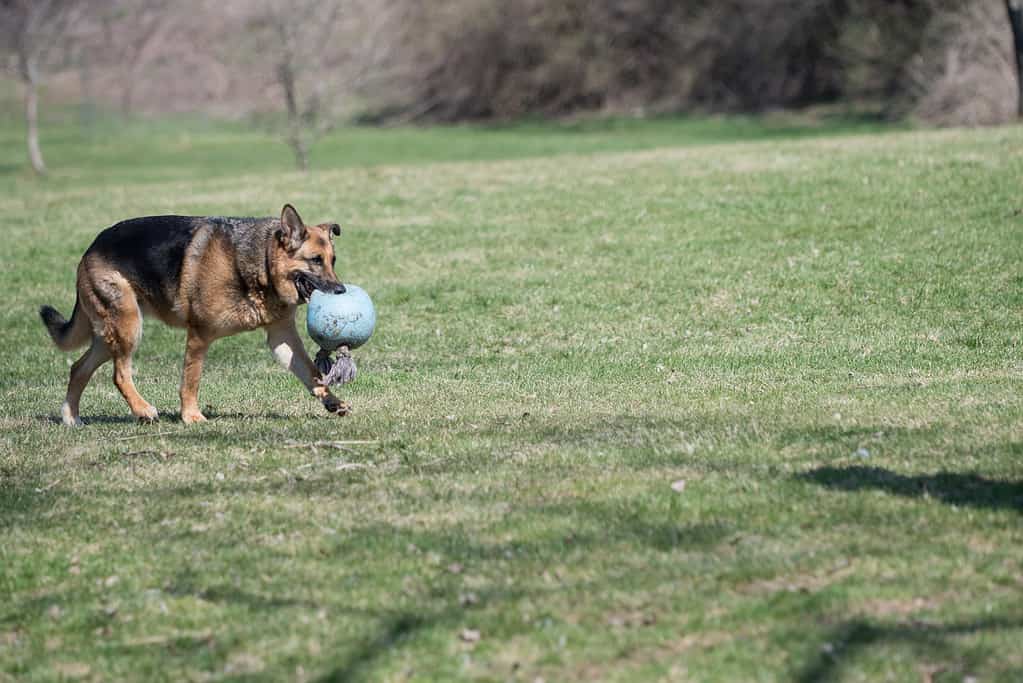
German Shepherds need space to run, preferably in a large backyard.
©iStock.com/Kyle Reynolds
Generally, most people aren’t suited to keeping a German Shepherd in an apartment. They may also be banned due to weight limits for dogs in your building.
While no one should rely on the backyard alone to exercise their dog, it does make playtime easier and gives them a safe space to run around.
Keeping a German Shepherd in an apartment requires an additional level of dedication, and you must be committed to working with your dog and getting them the exercise they need each day.
#15: Destructive Chewing is Common in the Breed
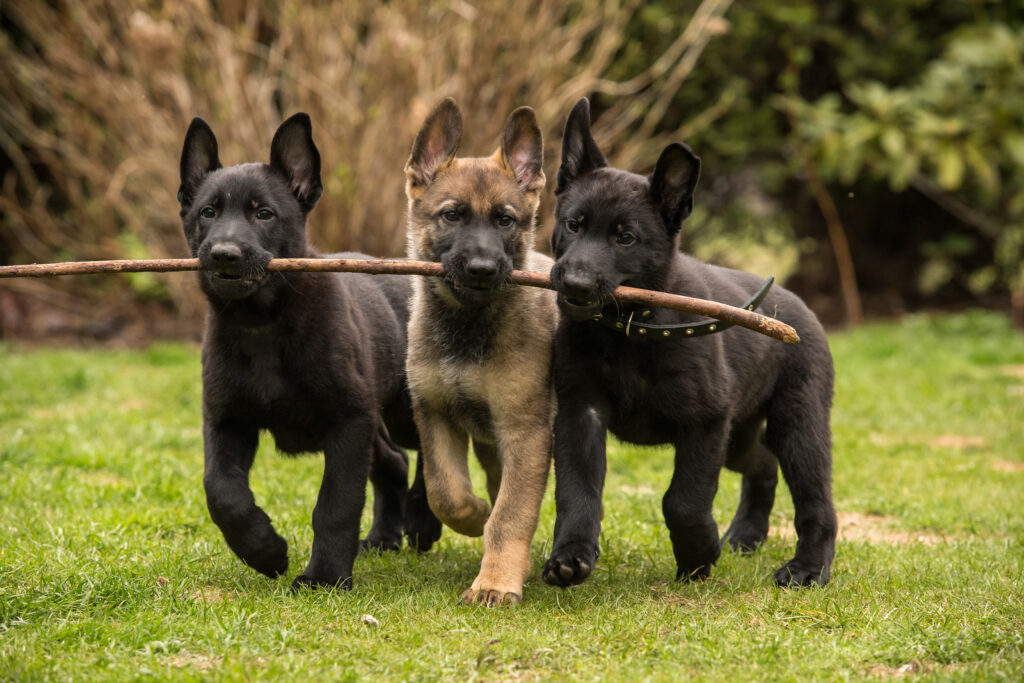
They enjoy chewing and may become destructive if not properly trained and cared for.
©DTeibe Photography/Shutterstock.com
German Shepherds are prone to separation anxiety and other anxiety disorders, which can lead a dog to chew in order to self-soothe. They’re also high-energy dogs that may become destructive if they’re bored and don’t have other activities to fill their time.
Destructive chewing can be especially problematic in large breed dogs like German Shepherds since they can chew apart large furniture and other tough items pretty quickly.
#16: They’re Prone to Joint Issues
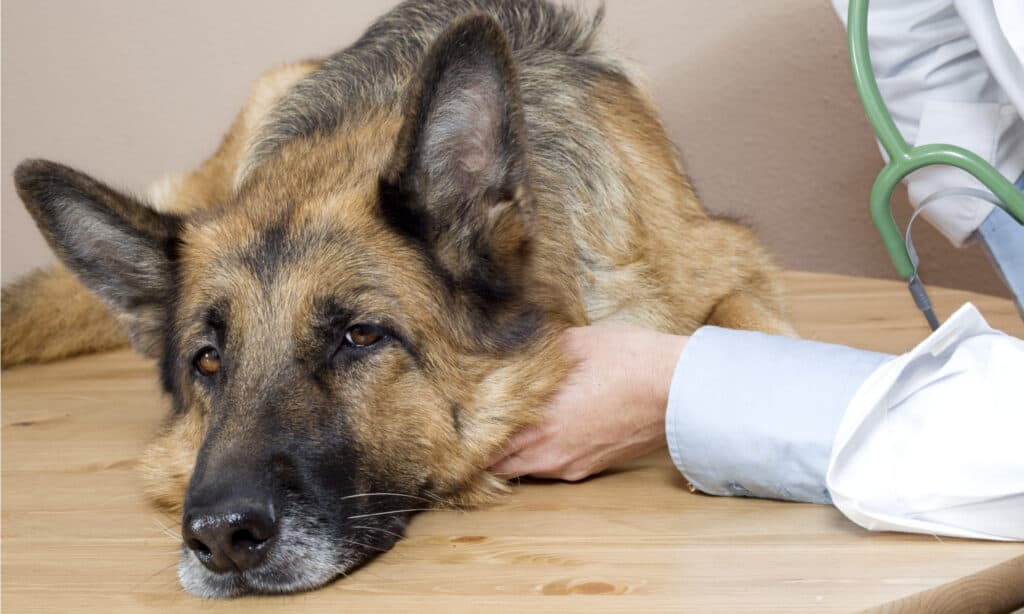
Joint issues are very common in the breed.
©Roger costa morera/Shutterstock.com
German Shepherds are prone to joint issues such as hip and elbow dysplasia, which occur when the hip or elbow joint doesn’t develop properly. Musculoskeletal conditions are one of the leading causes of death in the breed.
#17: They’re Prone to Degenerative Myelopathy
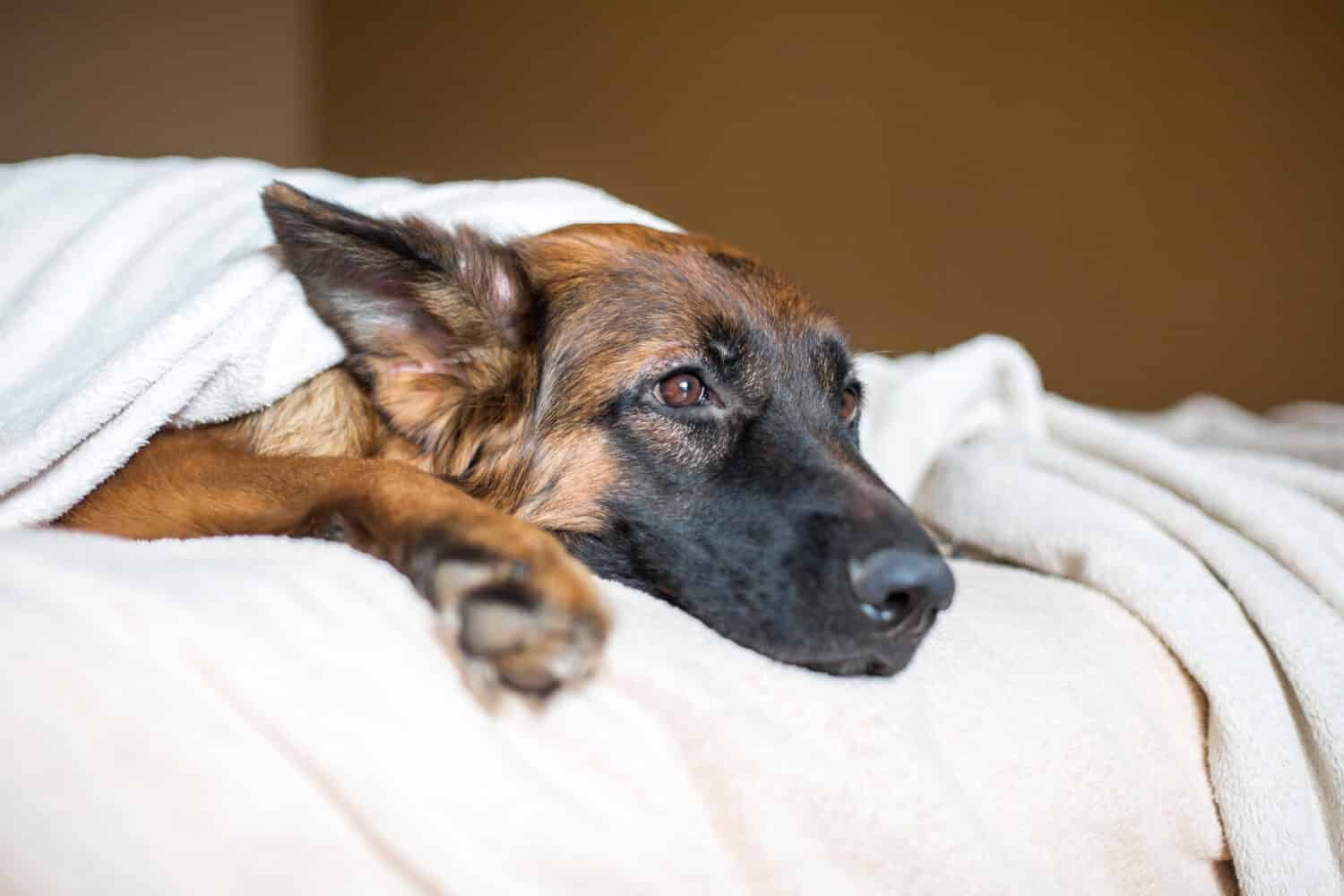
Degenerative myelopathy kills many senior German Shepherds.
©Korneeva Kristina/Shutterstock.com
Degenerative myelopathy tends to present at eight to nine years old. It’s a genetic condition that impacts the spinal cord and eventually leads to the paralysis of all four of a dog’s legs.
While not physically painful, degenerative myelopathy is debilitating and can cause emotional distress. It’s also deadly.
Most dogs are euthanized once they lose the ability to use their hind limbs, which are the first to lose movement. Those who aren’t will go on to have paralyzed front legs as well. They develop weakness, incontinence, and inability to stand.
#18: Many German Shepherds are Poorly Bred
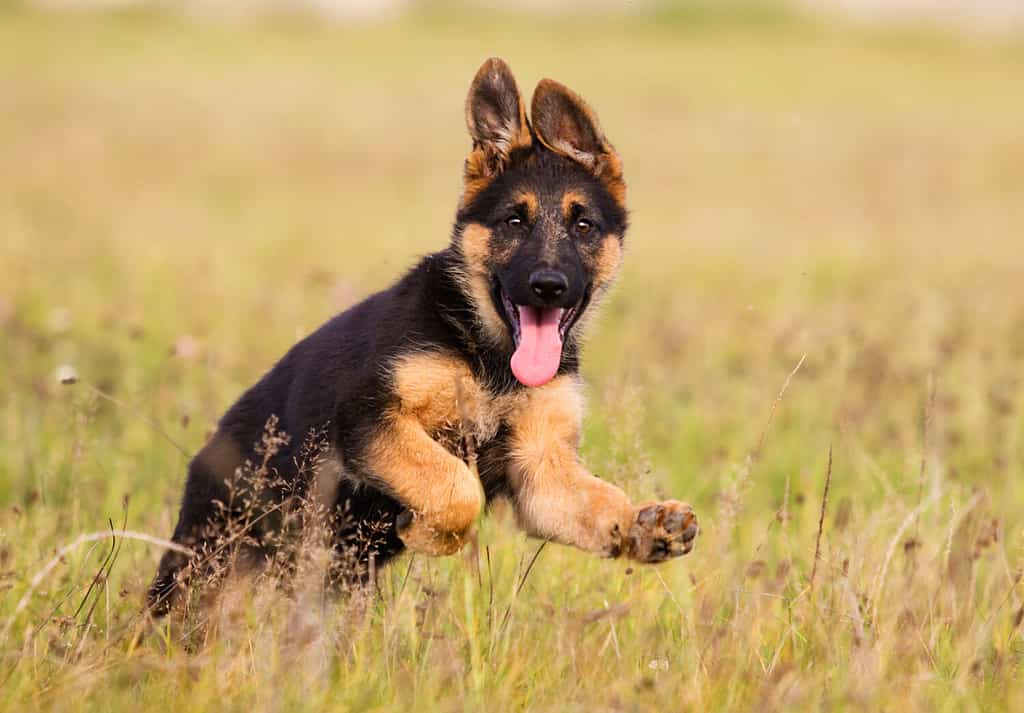
Backyard breeding of German Shepherds is sadly very common.
©Happy monkey/Shutterstock.com
Due to their popularity, there are a lot of German Shepherd breeders out there–and not all are breeding ethically. Far too many German Shepherds are born from backyard breeders or puppy mills.
Backyard breeders are usually ordinary people without the knowledge or care to breed responsibly, while puppy mills mass-produce puppies for profit without care for their health or well-being.
This can have negative impacts on their health and temperaments. Two common things we see in the breed are anxiety and joint issues. Dogs bred to have sloped backs tend to have more joint problems, so avoiding this and other poor breeding practices is a must.
Some ways to ensure you’re shopping with a reputable breeder are:
- They complete OFA health testing and never breed dogs with hereditary health issues.
- They ensure via contract and microchip that puppies will be returned to them if the placement doesn’t work for any reason and at any point in the dogs’ lives. Reputable breeders don’t allow their dogs to end up in shelters.
- They find homes for puppies before they’re born, not after.
- They don’t breed German Shepherds with sloped backs since this is known to increase their risk of joint problems.
#19: They’re Prone to a Deadly Condition Called Bloat
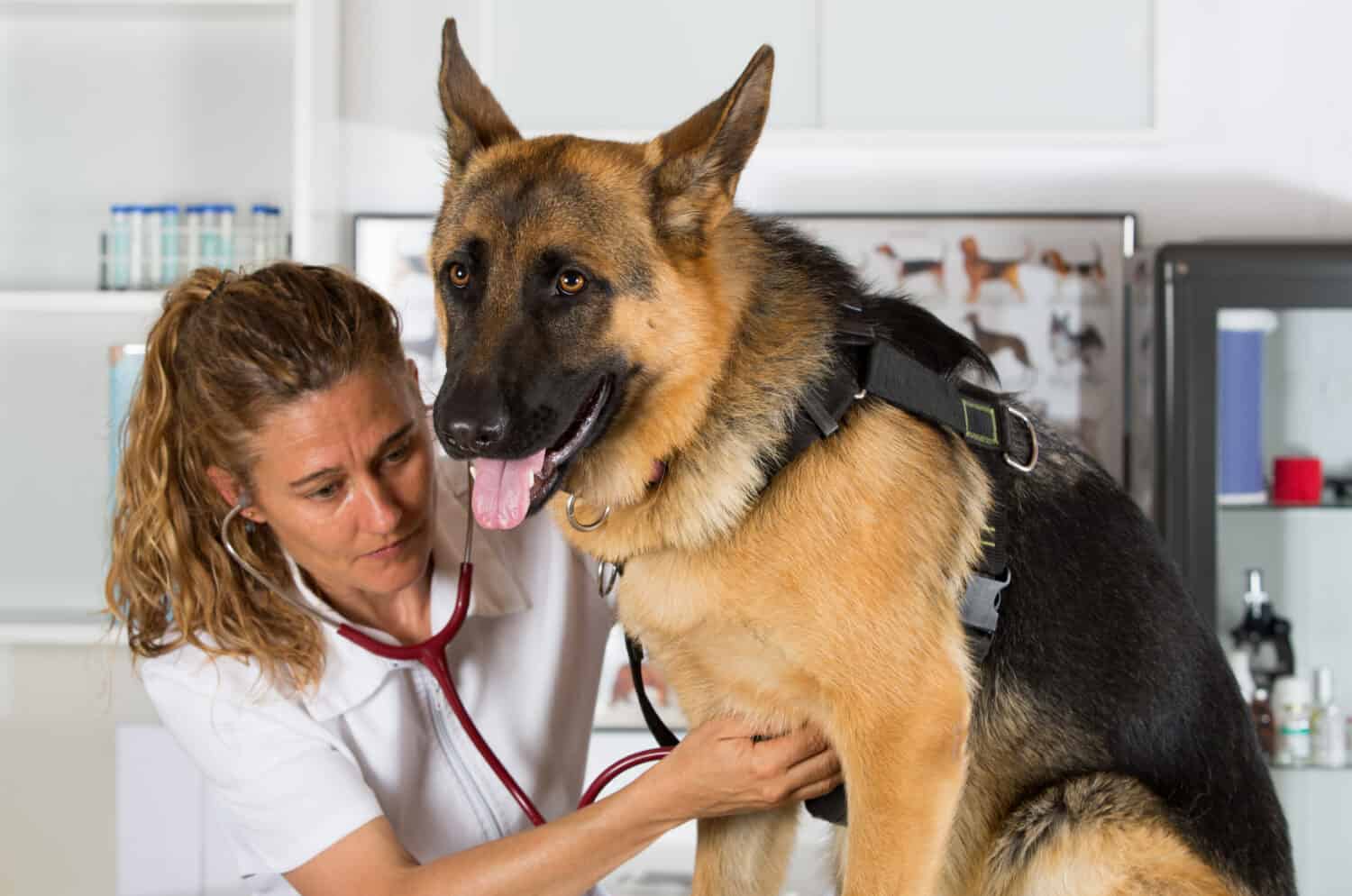
German Shepherds are prone to bloat, which requires an emergency vet visit for treatment.
©135pixels/Shutterstock.com
As large, deep-chested dogs, German Shepherds are more prone to bloat, or gastric dilatation-volvulus (GDV) than many other dog breeds. Males are also more likely to develop it.
When bloat occurs, a dog’s stomach fills with air, liquid, or food and twists. This cuts off blood circulation to other vital organs and can quickly kill the dog.
It’s vital to know the symptoms of bloat and to rush to your nearest emergency vet clinic if it occurs. Symptoms include:
- Swollen, painful abdomen
- “Downward dog” position with their head close to the ground and their butt in the air
- Retching
- Excessive drooling
- Restlessness
Keeping a calm environment, especially around mealtimes, can help prevent bloat. Avoid raised dishes, hydrating your dog’s kibble, and any foods containing soybean meal, oils, or fats within the first four ingredients.
A slow feeder can help stop your dog from eating too quickly, which puts them at increased risk. You may also choose to feed multiple small meals a day rather than less frequent, larger meals.
It’s also important to avoid exercise directly before or after a large meal or drink.
As you can see, there are many reasons not to adopt a German Shepherd. No dog breed is right for everyone, and shepherds are no exception.
However, German Shepherds are the perfect dog for many households. Even those who complain about their pups typically do so with love and wouldn’t change them for the world!
Whether or not these dogs are right for you will depend on your lifestyle, personality, and what you want from your furry friend.
Thank you for reading! If you have feedback on this post, please contact the AZ Animals editorial team.
The photo featured at the top of this post is © Sansargo/ via Getty Images
Ready to discover the top 10 cutest dog breeds in the entire world?
How about the fastest dogs, the largest dogs and those that are -- quite frankly -- just the kindest dogs on the planet? Each day, AZ Animals sends out lists just like this to our thousands of email subscribers. And the best part? It's FREE. Join today by entering your email below.
Thank you for reading! Have some feedback for us? Contact the AZ Animals editorial team.







